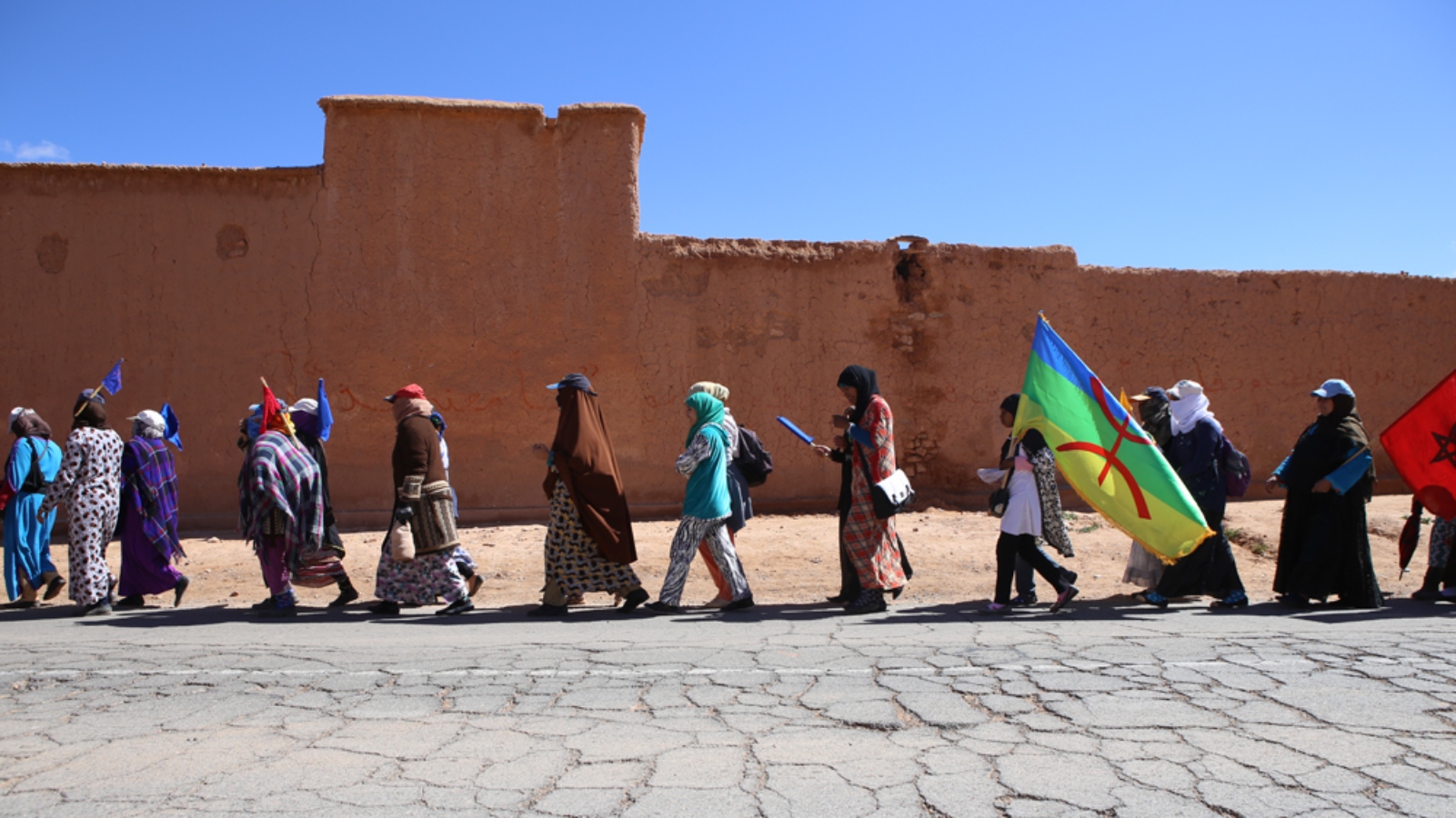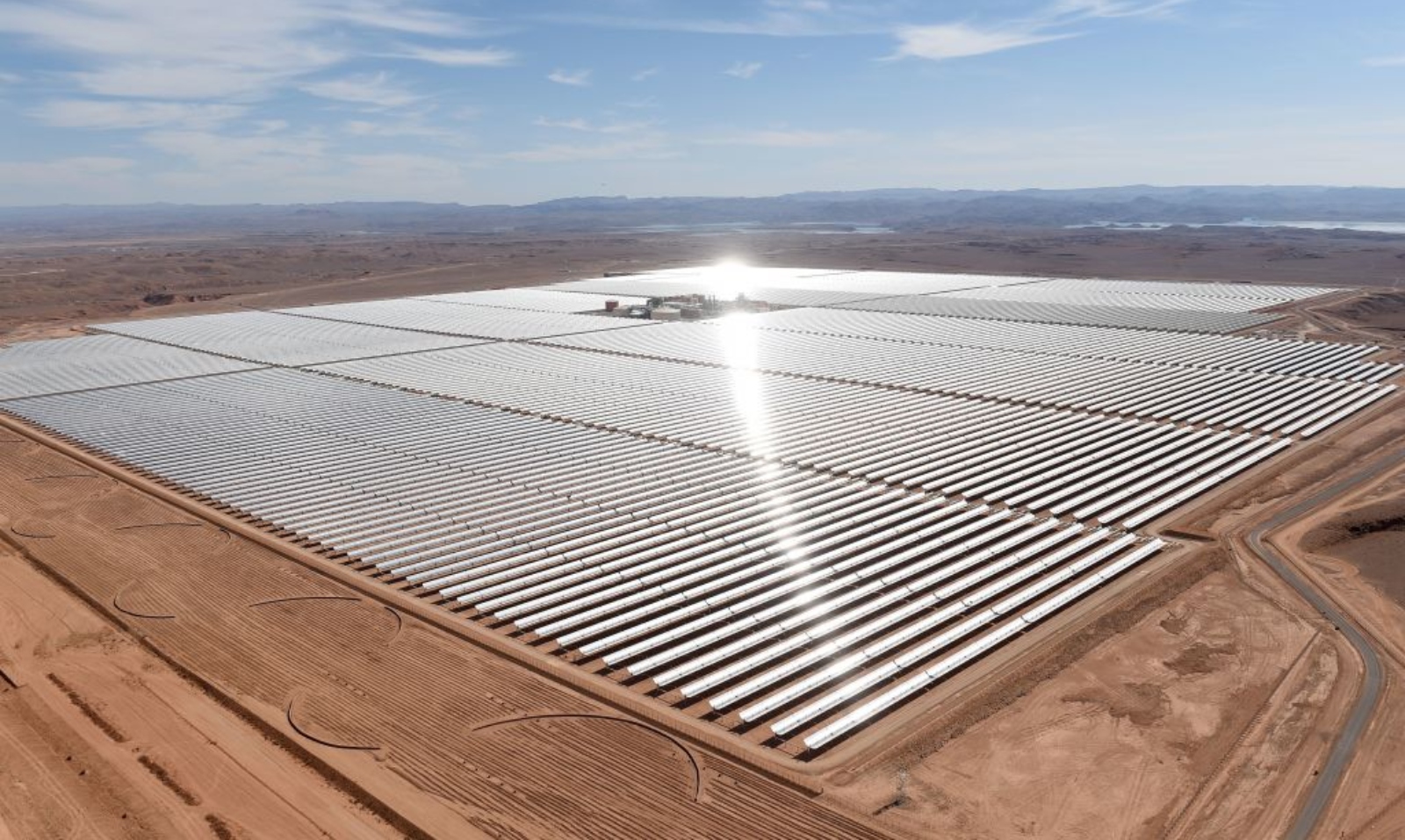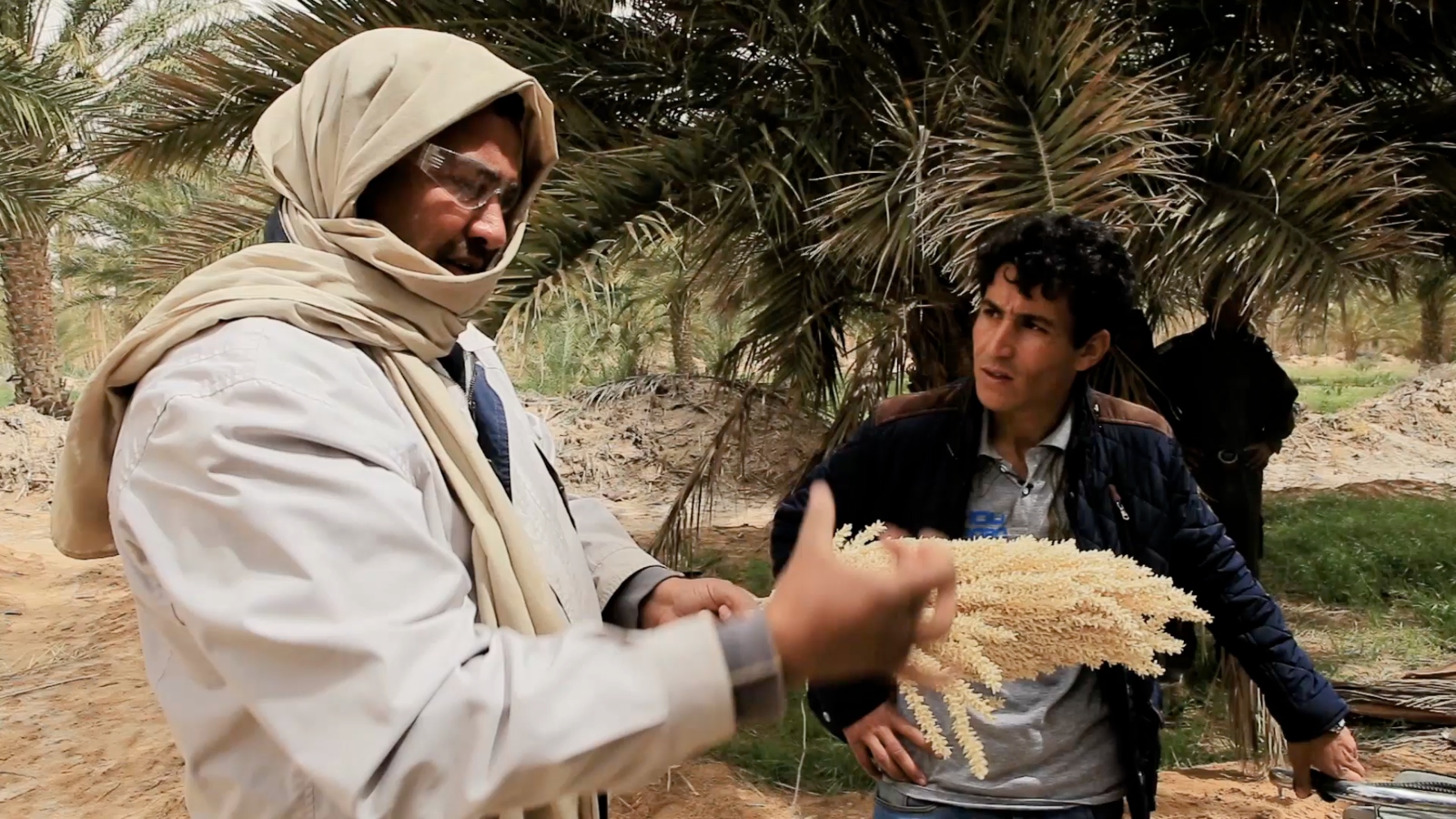This story was co-published with The Public Source.
For the second year in a row, world leaders met in the Arab world to negotiate the future of the planet. As a backdrop to the United Nations climate conference in Dubai, it’s a fitting venue for a planet-wide shift that scientists say needs to happen: The region has extensive deposits of oil and gas, but also immense, untapped potential for renewable energy.
Over the past several years, European governments and corporations have made moves to capitalize off this potential, investing in sprawling mega-projects to capture the sun’s energy from the region’s vast deserts and export the electricity north. The oil-rich states of the Persian Gulf, which constitute the region’s financial and geopolitical powerhouses, are also developing green hydrogen plants and wind and solar farms, with the aim of using renewable energy domestically in order to free up more of their fuel reserves for export. Activists and locals worry that the flurry of new mega-projects will reproduce the same exploitative practices associated with the fossil fuel industry: land grabbing, unchecked pollution, and the disenfranchisement of Indigenous people.
More than a decade after the start of the Arab Spring, when popular protests against repression and economic stagnation erupted from Tunisia to Syria, many of the same or equally oppressive power structures remain in place. Some of these governments appear to be prioritizing European countries’ renewable energy needs before meeting the demands of their populations. Given these challenges, what might a shift away from fossil fuels look like in the Arab world, one that distributes the benefits across the population, and what might other countries stand to learn from it?
This is the question that Hamza Hamouchene, an Algerian researcher and activist, has been exploring over the past five years. As part of his work with the Transnational Institute, an international research and advocacy institute based in Amsterdam, he has interviewed people across the region to ask about their experiences living near oil and gas deposits and planned renewable energy mega-projects. One of the products of that research is a new book of essays, edited by Hamouchene and Katie Sandwell, also of the Translational Institute, titled Dismantling Green Colonialism: Energy and Climate Justice in the Arab Region.
Underlying the book is the unequivocal urgency of moving away from fossil fuels in this part of the world. Large swaths of the Middle East and North Africa are warming at almost twice the rate of the global average, with devastating effects: blazes in the forests of Algeria and Syria, sandstorms choking the air in Iraq, and deadly heat waves gripping urban centers. But rather than serve the communities of the Arab world, many of the proposed renewable projects are for exporting energy abroad, and will do little to serve local people. Meanwhile, Gulf states have indicated their determination to extract every drop of fuel from their land, with COP28 President Sultan Al Jaber even casting doubt on the science of climate change at the conference in Dubai earlier this month. Grist sat down with Hamouchene to discuss COP28, the new book, and the future of the region’s renewable energy. Our conversation has been condensed and edited for clarity.
Lylla Younes: Why should people who care about getting the world off fossil fuels pay attention to what’s happening in the Arab world.
Hamza Hamouchene: First of all, clearly, there are many examples in the region of what some people call sacrifice zones [to serve] the energy transition in Europe, through export-oriented projects and land grabbing. Second, if we look at the numbers, just in 2021, 35 percent of the oil produced in the world was produced by the Middle East. The region is a nodal point of the global fossil fuel regime. This is described by Adam Haniah, in his excellent chapter of the book. He’s raising a warning to the climate justice movement and saying that the Middle Eastern countries, especially the Gulf countries, are going to be indisputable protagonists in any discussion around phasing out fossil fuels. And we are seeing this right now, in COP28 in the Emirates, where Sultan Al Jaber, the president of COP28, is an oil executive and the president of the Abu Dhabi Oil Company.
LY: And last month, several newsrooms reported on leaked briefing documents that revealed Al Jaber’s plans to use COP28 to secure fossil fuel deals, and the following week he came under fire for denying the science of climate change.
HH: Right, that’s the thing. These Gulf countries will constitute a really huge challenge to that transition away from fossil fuels. So for the global climate justice movement, if they just focus on Western companies like BP, Shell, or Exxon Mobil, they are missing the point. You need to focus on Gulf capital as well, and that is tied up with the question of democratization in the region and the redistribution of wealth in the region.
When we talk about the Arab region, there is the tendency to put every country in the same basket, like Saudi Arabia and Yemen, or Lebanon and the Emirates. These countries are in completely different categories. It’s not just that the Gulf is richer, much richer actually, than its neighbors, but it also participates in the capture of profits at the regional level, reproducing the same practices that we see from colonial countries — land grabbing in Egypt, Sudan, and even East Africa.
LY: And all of these places are experiencing the escalating severity of the climate crisis.
HH: There have been deadly wildfires in Algeria in the last two, three years, flooding in Libya that killed, I think, more than 10,000 people, droughts that have impacted small-scale farmers and food production. We have seen sea-level rise threaten some islands in the Mediterranean like Djerba and Kerkennah in Tunisia. Desertification, heat waves — the impacts are there and people are suffering from them right now. And they just exacerbate the multidimensional crisis that is already in the region. It’s not just an ecological or climate crisis, but also a food, energy, social, economic, political crisis that creates a kind of powder keg.

An anti-government protester holds a lit flare during a protest, in Beirut, Lebanon, in October 2019. AP Photo / Hussein Malla
LY: Let’s talk about the idea for the book. Why did you bring these researchers together to write it?
HH: Most of the writing and the analysis out there around the ecological crisis, the climate crisis, the energy transition, are dominated by international neoliberal institutions like the World Bank, international aid agencies, the European Union agencies, USAID, and so forth. And their analysis is biased toward the most powerful. They do not take into account questions of class, race, gender, power, colonial history. The solutions that they propose are, let’s say, superficial. They do not go into the root causes of the ecological crisis, the food and energy crisis. So the book wanted to remedy this state of affairs by centering voices from the Arab region and to shine a light on some of the aspects of the energy transition there, and how to make it a just and equitable process for the communities and the working people in the region.
LY: Can you describe what climate injustice and fossil fuel extraction has looked like in the communities that you’ve researched across North Africa?
HH: In Algeria, I’ve done some fieldwork in two towns, Ouargla and Ain Saleh. Ain Saleh is the site of the anti-fracking uprising of 2014-2015. I thought it was important to study the case there and to interview people and leaders and activists who participated in that uprising. It was a proper intifada because all elements of the community erupted — women, old people, young people, students, workers — because they saw it as, how can I say, another example of accumulation by dispossession. The Algerian military regime, along with national and foreign companies, came in there just to extract fuel and then created a new sacrifice zone by polluting the water, and the local communities did not benefit.
And then Tunisia and Morocco have phosphate mining. If you visit those sites, you will really understand the meaning of sacrifice zones. It really [affects] peoples’ bodies, their health, their environment, their air. Near the mine in Gabès, Tunisia, where the first part of the phosphate is processed for export, you see how the fishers are affected, the small farmers are affected, the water is plundered.

Women protest a silver mine in Imider, Morocco. Nadir Bouhmouch
LY: You’ve described the exploitative legacy of the fossil fuel industry in North Africa and the Middle East. I’m wondering if you can also offer a vision of what you think it should move toward?
HH: It’s not going to be the same in every country. If we’re really talking about a just transition, we need to challenge the power of the Gulf, in terms of their authoritarianism, but also in terms of their capital accumulation and how they are dominating various sectors in the Arab region. We want to move away from an extractivist, fossil fuel, environmentally destructive, socially exploitative system, to a more sustainable, just, and equitable system for all its members. People call this different things. I call it eco-socialism. I’m not sectarian about this, as long as we agree on the principle and we want a more just and more sustainable future.
LY: That is a daunting aspiration.
HH: It is a utopia, right? What can we do right now? Let’s say we focus on the energy question. Energy shouldn’t be a commodity. It should be a public good for everybody. And there are a lot of examples that show how this is not impossible to do. So we need to de-privatize, wherever the energy sector has been privatized, and we need to resist all attempts to privatize renewable energy as we’re seeing in Tunisia, Morocco, Egypt, Jordan, and even Algeria. At the same time, the local communities and the workers need to be involved in those projects. And that’s where the question of democratization comes in. We’re not talking about elections, in the liberal, bourgeois sense of democracy. We’re talking about the communities really shaping those projects, embracing those projects. Nothing is going to be perfect, there will be compromises, there will be mistakes, but if we want to avoid creating new green sacrifice zones, that is what we want.
LY: Given that all countries, not just the United States and in Europe, need to shift away from fossil fuels, how should we think about the renewable mega-projects being proposed in the region?
HH: All countries have a responsibility to move toward renewable energy. But because the historical responsibility of causing the climate crisis lies within the industrialized West, these countries need to move swiftly and rapidly to invest a lot of money to move toward renewable energy. And it’s not just the West, I would put the Gulf as well in there. They have a big responsibility. I would put China in there as well.
But for the Global South, you cannot go and tell Tunisia you need to move as fast as possible toward renewable energy, right? These countries have the right to develop. They have the right to provide a decent livelihood [for their people] before thinking of exports, but what we are seeing right now is the opposite. We are seeing these countries shoulder the burden of the energy transition. All these mega-projects are being implemented for export, not to produce energy for local markets — Desertec in six countries across North Africa, Xlinks in Morocco, TuNur in Tunisia. They are developed by the private sector, by foreign companies. They tend to be either Western or Gulf companies and some of them are Chinese as well. And all these projects are done through private-public partnerships, which is a euphemism for privatizing profit and socializing the losses. I’m not against those mega-projects, because we need to move fast toward renewable energy, given the current escalating climate crisis. Compromises need to be made, but not at the expense of local communities, not at the expense of the development goals of less advanced countries, not at the expense of access to energy.

An aerial view of the solar mirrors at the Noor 1 solar power plant outside the central Moroccan town of Ouarzazate. Fadel Senna / AFP via Getty Images
LY: It’s depressing that a lot of the places developing renewable energy for export are not meeting the electricity demands of their own population.
HH: Let me give you this example. In Namibia, there is a big green hydrogen project being built right now with the former colonial power, Germany. The project is owned by the Germans and the British. They are building a huge project, building solar panels, wind farms, and then using desalinated water to break the hydrogen molecule and export green hydrogen to Germany. In Namibia, 45 percent of the population does not have access to electricity, and the electricity it uses is imported from South Africa. This project would make sense if you were building solar plants and wind farms to produce green electricity for your own usage, right? But not to produce green electricity for export.
LY: In Palestine, the situation is even more challenging, because Israel’s military occupation limits people’s access to electricity.
HH: The colonial dynamics I mentioned in the export-oriented projects are clearly discernible in the renewable projects erected and being built in occupied territories such as Palestine, the Golan heights, and Western Sahara, because they take place at the expense of colonized people and go against their right for self-determination. Israel has portrayed Palestine pre-1948 as an empty, parched desert, which has become a blooming oasis after the establishment of the state of Israel. Israel covers up its war crimes against the Palestinian people by posing as a green and advanced country, in a superior position to a fearsome and arid Middle East. This position has been reinforced with the signing of the Abraham Accords between Israel, the United Arab Emirates, Bahrain, Morocco, and Sudan in 2020, and through agreements to jointly implement environmental projects — renewable energy, agribusiness and water, which are are a form of what is described as eco-normalization — the use of “environmentalism” to greenwash and normalize Israeli oppression.
We must always ask: Who owns what? Who does what? Who gets what? Who wins and who loses? And whose interests are being served? Because if we don’t ask these questions we will go straight to a green colonialism, with an acceleration of extraction and exploitation, in the service of a so-called common “green agenda.”
LY: We’ve talked about how both fossil fuel and green energy projects often extract resources from communities and give little in return. Can you think of a successful example, one that offers a sort of guide for equitable climate solutions?
HH: In 2011, at the time of the Tunisian revolution, the revolutionary council in the southern oasis town of Jemna recaptured land that had been taken away from them during colonial times. Even after independence in 1956, the state offered the land to two investors who captured all of its wealth. So in 2011, the people of Jemna recaptured the land and started managing the whole oasis, in terms of agriculture, in terms of selling the dates, in terms of marketing them. And all the proceeds that they got, they invested in the community. They remodeled the school, they bought an ambulance. That was truly inspiring. When people are given the power, and especially in a revolutionary context, people can do a lot.

An agriculture worker in Jemna, Tunisia. Nadir Bouhmouch
LY: We are more than 10 years out from the Arab Spring, with some pretty discouraging results. How can communities across the region end their dependence on fossil fuels without sacrificing aspirations for democracy and freedom?
HH: What you’re asking me is how are we going to make the next revolution successful, right? There is no easy answer for this. From history, we’ve seen how most revolutions fail. This is the reality, and some revolutions take other revolutions to succeed. We’ve seen the French Revolution; it took more than a century to become a republic. It’s the same thing in the Arab region. We have seen two waves of uprisings, the first in 2011. Most of them have been defeated. This is the reality. And then we saw the second wave [in 2018], and most of them have been defeated. But what it shows is that there is a protracted, long-term revolutionary process taking place, with ups and downs, sometimes victories, sometimes failures, sometimes defeats. What we know is that the people in the region are not passive victims. They say, “We are here. We are going to resist.”
>>> Read full article>>>
Copyright for syndicated content belongs to the linked Source : Grist – https://grist.org/international/abandoning-fossil-fuels-renewables-the-arab-world/










